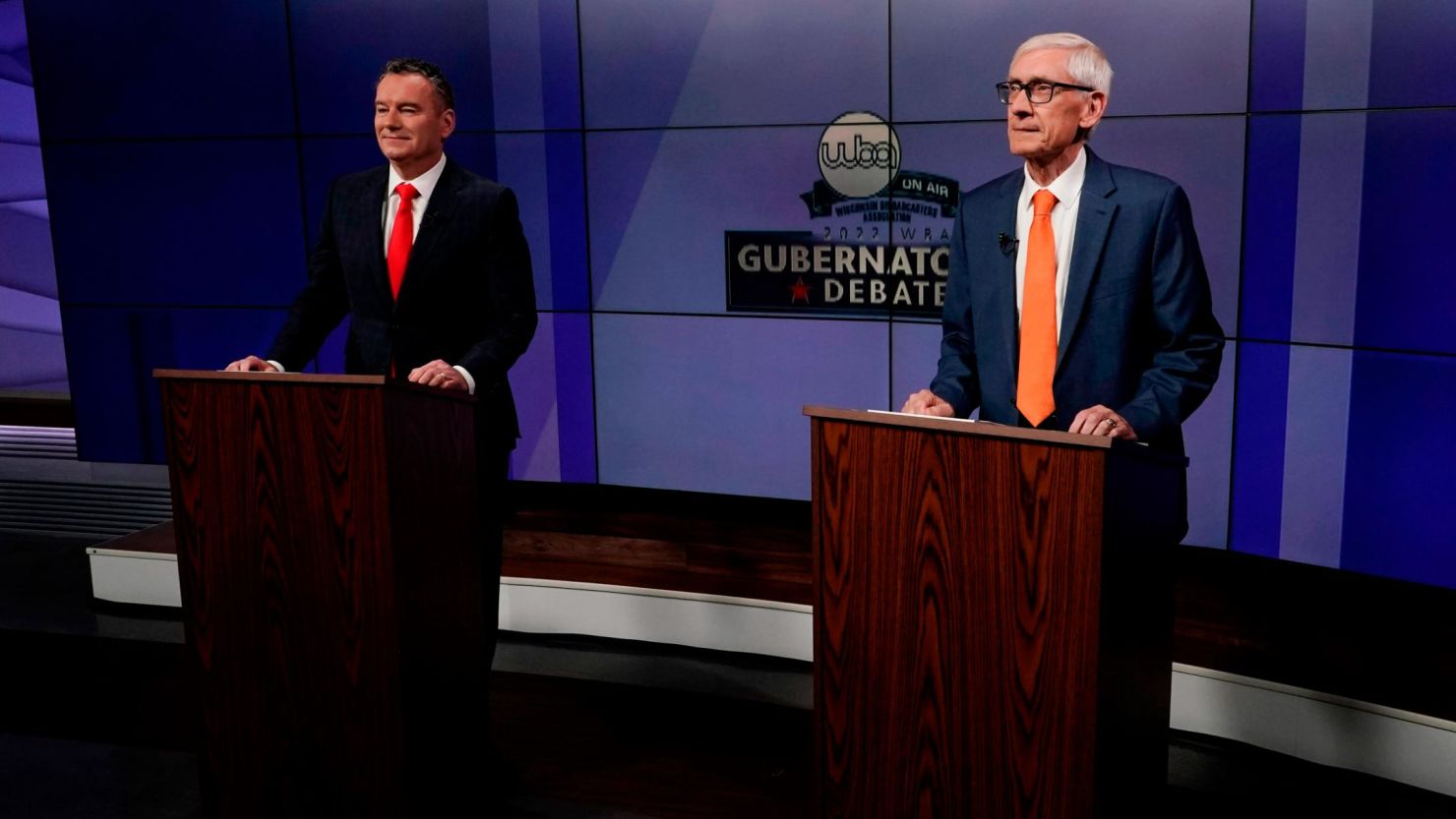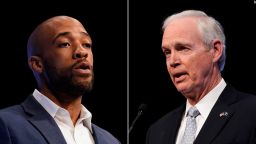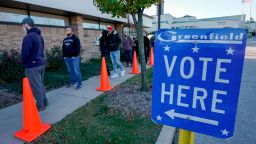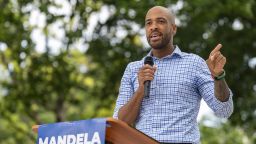Democratic Gov. Tony Evers of Wisconsin and his Republican challenger, Tim Michels, clashed in a debate Friday night over the swing state’s election administration, as Michels vowed to sign into law a series of restrictive voting measures that the incumbent has vetoed.
The stylistic differences between the two nominees were on display in Madison in their first and only debate.
Evers demonstrated his technocratic approach, diving into detailed proposals to issue child care tax credits, share state government revenue with local governments, eliminate the “minimum markup” law that requires gas stations to charge at least 9% more than what they pay for gas, and reduce state income taxes for middle-class earners by 10%.
Michels was much shorter on specifics, promising “massive tax reform” without offering details. Instead, he sought to portray Evers as a weak leader.
“I’m a businessman. I understand macroeconomics. I understand how to read a balance sheet,” Michels said.
The outcome of Wisconsin’s race for governor could have significant implications for the 2024 presidential election – a contest in which Wisconsin could reprise its role as a marquee swing state.
Here are six takeaways from Friday’s gubernatorial debate in the Badger State:
A clash over election integrity
Evers defended the integrity of Wisconsin’s elections, saying Republicans were claiming massive fraud in the 2020 presidential election “without having any idea or any specifics.”
“It was safe, fair and we can have confidence in our election,” Evers said.
The Democratic governor this year vetoed a series of bills approved by the GOP-led legislature that would have imposed new requirements on mail-in voting and new citizenship verification; required the state to deactivate more voter registrations; banned the use of private election grants; and shifted election oversight to the legislature.
Michels mentioned “Zucker bucks,” a reference to Facebook founder Mark Zuckerberg and his wife, Priscilla Chan, donating $350 million to the Center for Tech and Civic Life to help election officials and voters safely navigate the coronavirus pandemic. He also said he would outlaw “ballot harvesting,” the practice of allowing another person to hand in a voter’s absentee ballot.
And he highlighted a judge’s ruling this fall that led the Wisconsin Elections Commission to withdraw its guidance to clerks to fill in missing information on absentee ballot witness certificates.
“I will make sure that once I’m governor, we never have these questions again about election integrity. I will work with the legislature. We will get these bills right – the bills that Gov. Evers vetoed,” Michels said.
Both nominees vow to certify elections
Evers and Michels both said they would certify the next election in Wisconsin that takes place while they are governor.
Evers said he would certify the outcome of the gubernatorial election “no matter who wins.”
“Of course, I will certify the next election,” Michels said.
But Michels said the state also needs to address concerns about election security. The Republican has previously embraced former President Donald Trump’s false claims of fraud in the 2020 presidential election. While he did not promote those claims Friday, he also did not acknowledge that election security concerns exist as a result of Trump’s lies.
“I want to make sure, after I’m governor, that we’re not having these conversations two years from now, four years from now, and beyond,” Michels said.
A clear contrast on abortion rights
Michels said Friday he is “pro-life” but would sign legislation that allows for exceptions for rape and incest to the state’s 1849 abortion ban, which was allowed to take effect after the US Supreme Court overturned Roe v. Wade this summer. Wisconsin’s GOP-led legislature has not yet advanced a measure to allow such exceptions.
The Republican also said he is “not against contraception” and downplayed the possibility of enforcing criminal penalties against those who seek abortions in other states.
“I’m a commonsense guy, and I’ve listened to the people, and I’ll always listen to the people,” Michels said.
Evers has pushed state GOP lawmakers to support changing state law to allow for a statewide referendum on the 1849 ban. He recently called lawmakers into a special session urging them to allow citizens to put forth such a referendum, but the GOP-led Assembly and Senate both adjourned in less than 30 seconds without taking action.
Evers on Friday described Michels as “radical” on the issue and said Wisconsin should return to the abortion rights protections that existed before Dobbs ruling.
“The bottom line here is this: Women should have the ability and the right to make decisions about their health care, including reproductive health care, and that includes abortion,” Evers said.
Evers backs gun control measures that Michels calls unconstitutional
Evers and Michels also clashed over gun restrictions, with the governor saying he supports universal background checks and “red flag” laws and Michels responding that such laws were unconstitutional.
Asked about violent crime in Milwaukee, Michels touted the time he has spent in the city and said many homicides there were a result of knife violence, rather than guns. He said he sees red flag laws as a “slippery slope.”
“With the millions of guns in Wisconsin, we need to make sure that the responsible gun owners are not going to be subject to having their guns taken away without due process,” he said.
Evers said his plan to combat gun violence includes sharing state revenue with local governments. He also advocated red flag laws and universal background checks, two gun restrictions that currently have no path forward in the GOP-dominated legislature.
“Responsible gun owners don’t have to worry about red flag laws, because it will never be an issue for them,” Evers said.
Michels vows to ‘be tough’ on crime
Michels hammered Evers over the Wisconsin parole commission’s decisions to grant hundreds of discretionary paroles not required by law.
Those paroles have been routine in the past, but Republicans in Wisconsin have blamed Democrats for increases in violent crime. The state saw a 70% increase in homicides from 2019 to 2021 – a trend that occurred across the nation and that experts say was driven by the coronavirus pandemic and economic factors.
The paroles, Michels said, showed Evers following through on his 2018 campaign pledge to cut the state’s prison population in half.
“They released over 1,000 convicted felons. They have about 10,000 more to go if you do the simple math,” Michels said. “I will pick a chief parole commissioner who is going to make sure that we have rule of law in Wisconsin.”
Evers, meanwhile, pointed out that the parole commission is not controlled by the governor, though the governor does appoint its chair. Commission chair John Tate resigned under criticism in June, which Evers noted was at his urging.
“This is about shared revenue. We can talk about parole, but we also have all sorts of issues in the criminal justice system,” Evers said.
Michels shot back: “You heard, more money, more resources, more resources, and it doesn’t matter about leadership. … I am going to be tough, and I am going to talk tough.”
CRT or the ABCs?
Evers and Michels also sparred over education, an issue on which Michels supports allowing public dollars to follow students to private schools while Evers wants more funding for public schools.
“You would think that education will be going well under his leadership, but it’s not. Something has to change,” Michels said of Evers, who was the former chief education official in the state before he was governor.
He added: “It can’t get any worst. It will get better because we’re going to empower parents, those tuition dollars are going to go with the parents of the sons and daughters. … And we’re going to stop the CRT and get back to the ABCs,” Michels said, referring to critical race theory, a concept that has become politicized in recent years.
Evers countered: “CRTs are not taught in our schools. And the ABCs are.”






